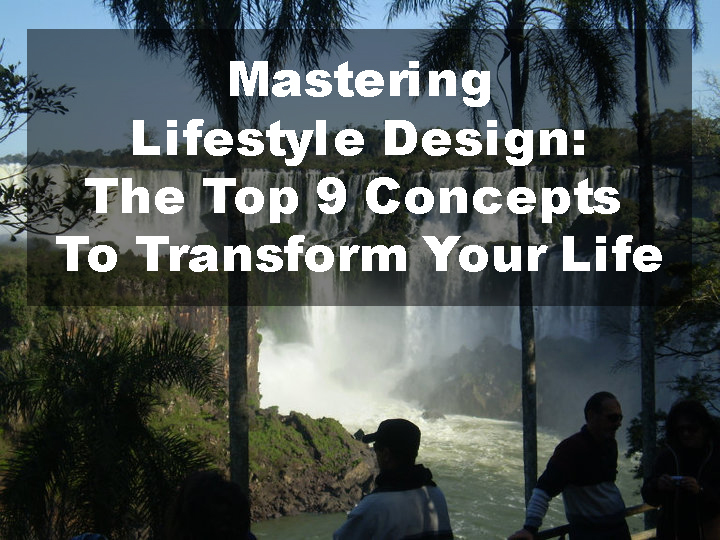In a world where time is the ultimate currency and choices shape destinies, the idea of lifestyle design has emerged as a beacon guiding people towards crafting lives of:
- Purpose
- Fulfillment
- And abundance.
Rooted in principles ranging from economics to psychology, lifestyle design offers a framework for intentional living, enabling you to optimize your:
- Time
- Resources
- And energy
to create the life you desire.
Within this expansive field, nine key concepts stand out as pillars of transformation.
Let’s delve into each of these concepts to understand their significance in mastering lifestyle design.
1. Positioning:
Positioning lies at the heart of lifestyle design, emphasizing the strategic placement of yourself in a way that maximizes opportunities and minimizes obstacles.
Just as in business, where successful companies identify and occupy unique market positions, you can leverage your:
- Strengths
- Passions
- And skills
to carve out a distinctive niche in life.
By understanding your unique value proposition and aligning it with market demands or personal aspirations, you can create a competitive advantage that opens doors to success and fulfillment.
2. Anti-Fragility:
The concept of anti-fragility goes beyond resilience, suggesting that certain systems or individuals thrive under volatility, uncertainty, and disorder.
Embracing anti-fragility involves cultivating:
- Resilience
- Adaptability
- Superior positioning
- And a growth mindset
Instead of merely surviving adversity, anti-fragile individuals harness challenges as opportunities for:
- Learning
- Growth
- And innovation
emerging stronger and more resilient with each setback.
3. Payoff Space:
Identifying and focusing on activities within the payoff space is crucial for maximizing productivity and satisfaction.
By allocating time and resources towards a higher impact LANE that aligns with personal goals and values, you can amplify their effectiveness and achieve greater success with less effort.
4. Frontloading:
Frontloading entails investing significant time, effort, or resources upfront to reap long-term benefits later on.
Whether in:
- Education
- Career
- Relationships
- Or personal development
frontloading involves making strategic sacrifices and commitments in the present for future gains.
By embracing delayed gratification and prioritizing long-term objectives over immediate pleasures, you can lay the foundation for enduring success and fulfillment.
The earlier you set yourself up, the better.
5. Time Value of Money:
The time value of money asserts that a dollar today is worth more than a dollar in the future due to its potential earning capacity.
This concept extends beyond monetary considerations to encompass the value of time itself.
By recognizing that time is a finite and irreplaceable resource, you make more informed decisions about how to allocate your time wisely, prioritizing activities that yield the highest returns in terms of:
- Personal fulfillment
- Growth
- And happiness.
6. Compounding:
Compounding, often referred to as the eighth wonder of the world by Albert Einstein, is the process whereby small, incremental gains accumulate over time to generate significant outcomes.
Harnessing the power of compounding involves cultivating:
that yield exponential returns over the long term.
By consistently investing in:
- Self-improvement
- Personal development
- And meaningful connections
you can amplify your impact and create a ripple effect of positive change in your lives and the lives of others.
7. Opportunity Cost:
Every decision incurs an opportunity cost – the value of the next best alternative foregone.
Understanding opportunity cost enables people to make informed choices about how to allocate their limited resources of:
- Time
- Energy
- And attention.
By weighing the potential benefits and drawbacks of different options, you can prioritize activities that offer the greatest value and align most closely with your goals and aspirations.
8. Diminishing Returns:
Diminishing returns states that as input increases, the additional output or benefit derived from each incremental unit diminishes.
This concept warns against the trap of overcommitment and spreading yourself too thin.
By recognizing when to say no and setting boundaries, you can avoid burnout and ensure that your efforts remain focused and effective.
9. Expected Value Bets:
Rooted in decision theory, expected value bets involve weighing the probabilities of different outcomes to make informed choices that maximize expected value.
In lifestyle design, this concept encourages people to take calculated risks and pursue opportunities with favorable odds of success.
By balancing risk and reward and embracing uncertainty as an inherent part of growth and exploration, you can make bold decisions that propel you towards your desired outcomes.
Conclusion
In conclusion, mastering lifestyle design requires a nuanced understanding of these nine key concepts:
- Positioning
- Anti-fragility
- Payoff space
- Frontloading
- Time value of money
- Compounding
- Opportunity cost
- Diminishing returns
- And expected value bets.
By incorporating these principles into your life, you can design a future that reflects your values, passions, and aspirations, unlocking the full potential of human existence.
Whether striving for personal fulfillment, professional success, or a balanced lifestyle, the principles of lifestyle design offer a roadmap for realizing dreams and creating a life of purpose and abundance.
Want to learn more?
You May Also Like:
How To Save Time And Achieve More (Must Read)
Here's How To Earn Respect From Others
The Breathtaking Game Of Synthesizing Information
Life Is 10% What Happens, 90% How You Perceive It
Living Life on a Mission: The Key to Fulfillment, Purpose, and Success
The Freeze Out Plan - A Killer Fix For Disrespect
How To Develop Boundaries Like a Champion
The Spiritual Animates the Physical: A Journey Through Sacred Geometry and Ancient Wisdom
My name is Mister Infinite. I've written 600+ articles for people who want more out of life. Within this website you will find the motivation and action steps to live a better lifestyle.


